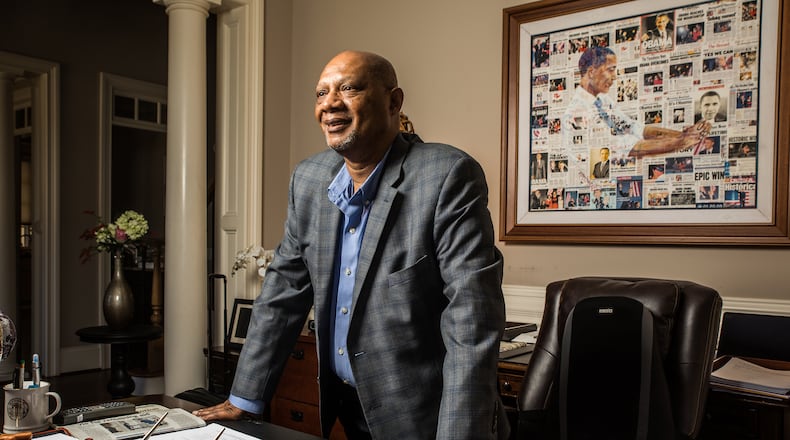When Bishop Reginald T. Jackson came to Atlanta to attend Turner Theological Seminary, part of the Interdenominational Theological Center, at age 22, he had a different view of ministry.
The focus, he thought, was solely getting people into Heaven.
After time, though, in a city with a long history of nurturing social justice-minded ministers, he developed a broader definition of what it meant to lead the faithful.
Last year, Jackson, 66, presiding prelate of the Sixth Episcopal District of the African Methodist Episcopal Church, renewed calls for a hate crime law in Georgia in 2019 when a white teen girl was arrested for planning an attack on an AME church in Gainesville and, later, after the shooting death of 25-year-old Ahmaud Arbery in the Brunswick area by two white men.
Now he is among the most vocal opponents of Georgia’s new, far-reaching elections overhaul, recently signed into law by Gov. Brian Kemp and backed by a Republican-led legislature.
“All of this is predicated on a lie that the election was stolen,” said Jackson, a former president of the Orange Public School System Board of Education in New Jersey and chairman of the board of Morris Brown College. “This is just an attempt to suppress the vote of Black and brown people and at the same time it is blatantly racist. It takes people back to the time of Jim Crow.”
Supporters of the legislation say the new laws will increase confidence in Georgia’s voting system after former President Donald Trump’s unsupported allegations of voter fraud in the state.
The Sixth District of the AME Church in Georgia is part of a lawsuit filed Monday night challenging the law, and Jackson has threatened a boycott of Georgia-based corporations like Delta Air Lines, Coca-Cola and Home Depot, which he said remained silent or did too little to oppose the bill.
On Monday, Alfredo Rivera, the president of Coke’s North America unit, sent a note to employees, that said while Coke was disappointed in the outcome, “we don’t see this as the final chapter.” He said the company “will continue to push for greater access to voting through advocacy at the federal level, where we expect to see more proposals this year aimed at expanding voter access.”
The new law, among other things, curbs absentee balloting, limits drop box times and locations and restricts outside volunteers from giving food and water to voters waiting in line.
Jackson said he hopes to meet with company executives soon before calling for a full-fledged boycott. He had hoped to meet with the governor before he signed the bill into law, but the meeting didn’t materialize.
Jackson has challenged government institutions before.
While a pastor in New Jersey and executive director of the then New Jersey’s Black Ministers Council, he pushed for reform and an end to racial profiling by the state police.
In Georgia, he has pushed for voter registration initiatives through AME churches and encouraged people to get vaccinated against COVID19. There are more than 500 AME churches in Georgia.
The Rev. Melvin Wilson, senior pastor of St. Matthew AME Church is not surprised that his longtime friend, Jackson, would be among the leaders in efforts to challenge the voting restrictions in Georgia.
Wilson leads the Orange, New Jersey church that Jackson once pastored. Jackson, a native of Dover, Delaware, grew the church from 75 members to more than 2,800.
“He’s just a pastor who knows everything about engagement with the church and the people in the community,” Wilson said. “He’s phenomenally politically engaged and a social justice advocate. Everything he does is related to social justice and he has a tremendous love for people. That’s just who he is.”
Some efforts have already started.
Social media posts with hashtags advocating for boycotts have asked consumers to avoid spending money with Delta and Coca-Cola. There have also been calls for Major League Baseball’s All-Star game to move out of Cobb County.
The Rev. Timothy McDonald III, pastor of First Iconium Baptist Church in Atlanta and a longtime Coke fan skipped buying the popular soft drink, which was on sale at his neighborhood grocery store, and purchased Pepsi instead.
He posted about it on social media and is encouraging his congregants to do the same.
“The only thing these large corporations understand is green,” said the longtime community activist. “The people need to speak. We know they have some of us sitting on their boards and they ought to be using their positions to do the right thing. Coca-Cola has been good to me and other organizations I’m associated with and I’m sure they will try to use that leverage. They will show how they give back. That’s to be expected, but that does not negate their silence.”
About the Author
Keep Reading
The Latest
Featured



